Dear Neighbors,
At Medford's Memorial Day observance, Veterans Service Officer Michael
L. Durham gave us some sobering information; the first part of this
newsletter contains excerpts of his remarks. He told us that many
service members survive injuries that would have been fatal in previous
wars, But many of those who survive carry visible and unseen injuries
that require care. This makes it even more important to consider the
changing needs of veterans as we plan to replace the Holyoke Soldiers'
Home.
The second part of this newsletter includes discussion of building a new
Soldiers' Home, and our work with leaders from Disabled American
Veterans and Dignity Alliance to ensure that we build a truly modern
facility, as well as other sites to serve veterans across the state.
|
|
|
Remarks of Medford Veterans Service Office Michael Durham
Oak Grove Cemetary, May 31, 2021(excerpt)
There have been approximately 7,000 US
combat deaths in Iraq, Afghanistan, and Syria over the last 20 years of
continuous war. What is not focused on often is the additional 52,300 US
combat casualties. Modern warfare techniques and technologies are
keeping wounded US service members alive that in previous wars would
have been lost. Machine gun fire puncturing lungs and landmines causing
quadruple amputations are some wounds that I have seen firsthand, and
both of those service members survived and are living productive lives
today...
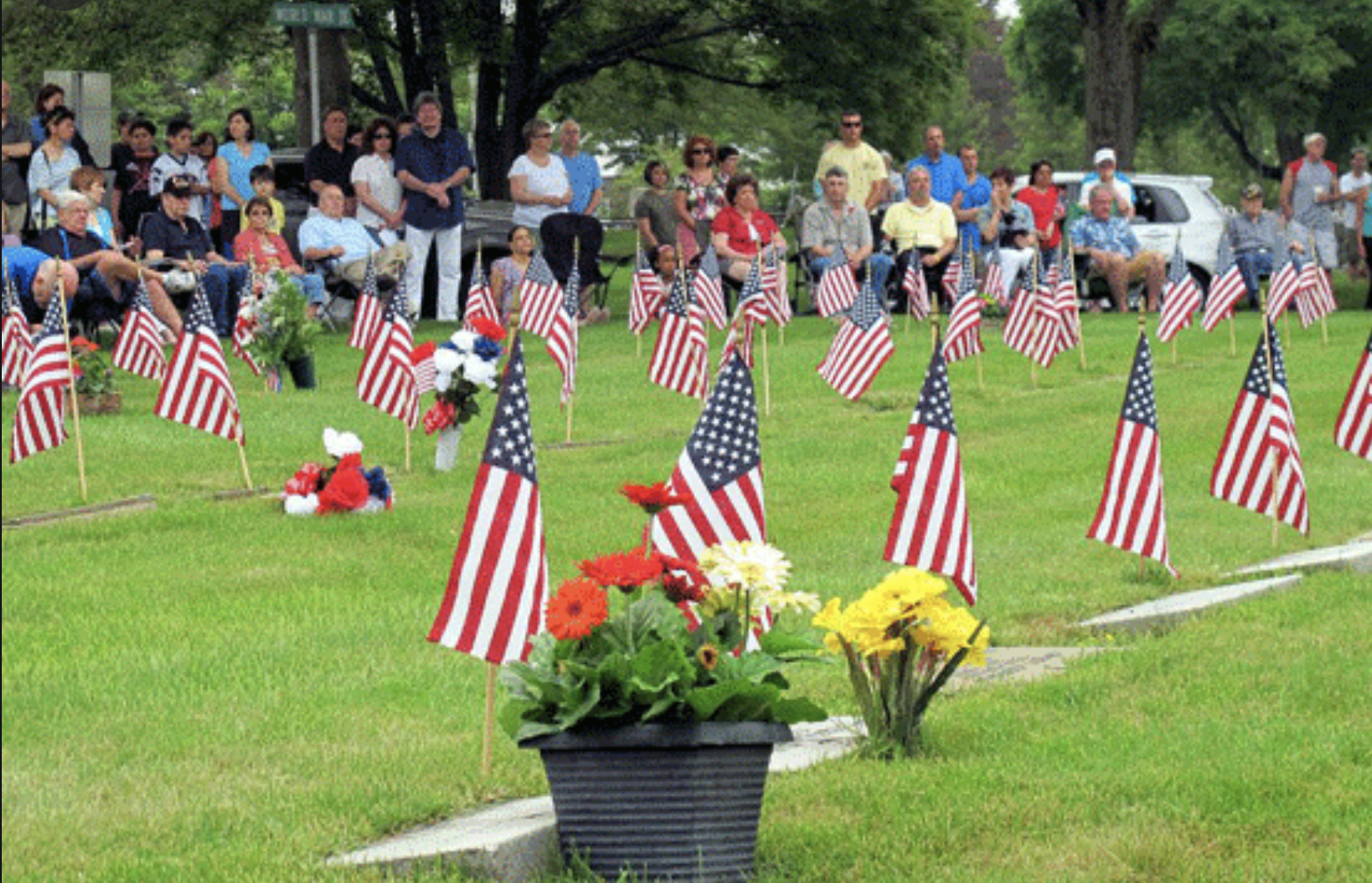 Half
of my reconnaissance company would have been killed if it were not for
mine resistant vehicles, anti-mine and IED technology, body armor,
advanced battlefield medical training, and aerial medevac
transportation. Even with all that training and equipment hundreds of
paratroopers from my Brigade received purple hearts that deployment. The
fighting was so intense the entire Brigade received an award for Valor. Half
of my reconnaissance company would have been killed if it were not for
mine resistant vehicles, anti-mine and IED technology, body armor,
advanced battlefield medical training, and aerial medevac
transportation. Even with all that training and equipment hundreds of
paratroopers from my Brigade received purple hearts that deployment. The
fighting was so intense the entire Brigade received an award for Valor.
My point is those who were shot in their ballistic plates, blown up in a
truck, or peppered by mine shrapnel and machine gun fire all lived
through it and came home back to our community, whereas in past wars
they might not have. Those Veterans carry mental and physical scars of
war their whole lives.
We have lost more members of my unit over the last ten years to suicide
here back home in the United States than we did in combat in
Afghanistan. 20 Veterans are going to kill themselves today in our
country. We have had 115,000 Veterans commit suicide since 2001. Should
we add those to the official war casualty report, bringing the cost of
the War on Terror 174,000 US casualties over 20 years?
We
can, and we must, do better to reintegrate our returning Veterans back
to our community and end this veteran suicide epidemic. We must do more
than just place flags. We must continuously reach out to those among us
who served in these conflicts as friends, as families, and as a
community. Do not just let “Thank you for your service” be empty words.
We need to back that statement up with action and inclusion.
In addition to a veteran suicide epidemic there is also rampant Veteran
hiring discrimination occurring across all industries. Last year the
U.S. Equal Employment Opportunity Commission (EEOC) stated that Post
9/11 Veterans are suffering the highest unemployment rate of when
compared to all other past Veteran data, including Vietnam War
Veterans. Post 9-11 Veterans are worse off now finding jobs thanVietnam
Veterans were during the height of the Vietnam War.
Did you know if you hire a Veteran into your business that Federal
Government will pay 70% of their salary for you? Call my office I would
be happy to provide you the details. There are ways to help. I challenge
each of us to find a way to transform “Thank you for your service” from
words into action. That personal initiative to assist local veterans
might result in less flags our cemeteries next Memorial Day.
|
|
|
Soldiers' Home
Last spring, as the pandemic devastated nursing homes across the state
and country, more than 70 residents of the Holyoke Soldiers Home died.
The heart-breaking stories have led to a Globe Spotlight Team report on the failures of the Baker administration, calls for reforming the administration at Soldiers Homes
in both Holyoke and Chelsea, and a plan to build a new Holyoke Soldiers
Home. The photo below of the Home, and the shocking note about the
staff being told not to wear masks, is from the Spotlight report. The
report is extremely disturbing, and worth reading.
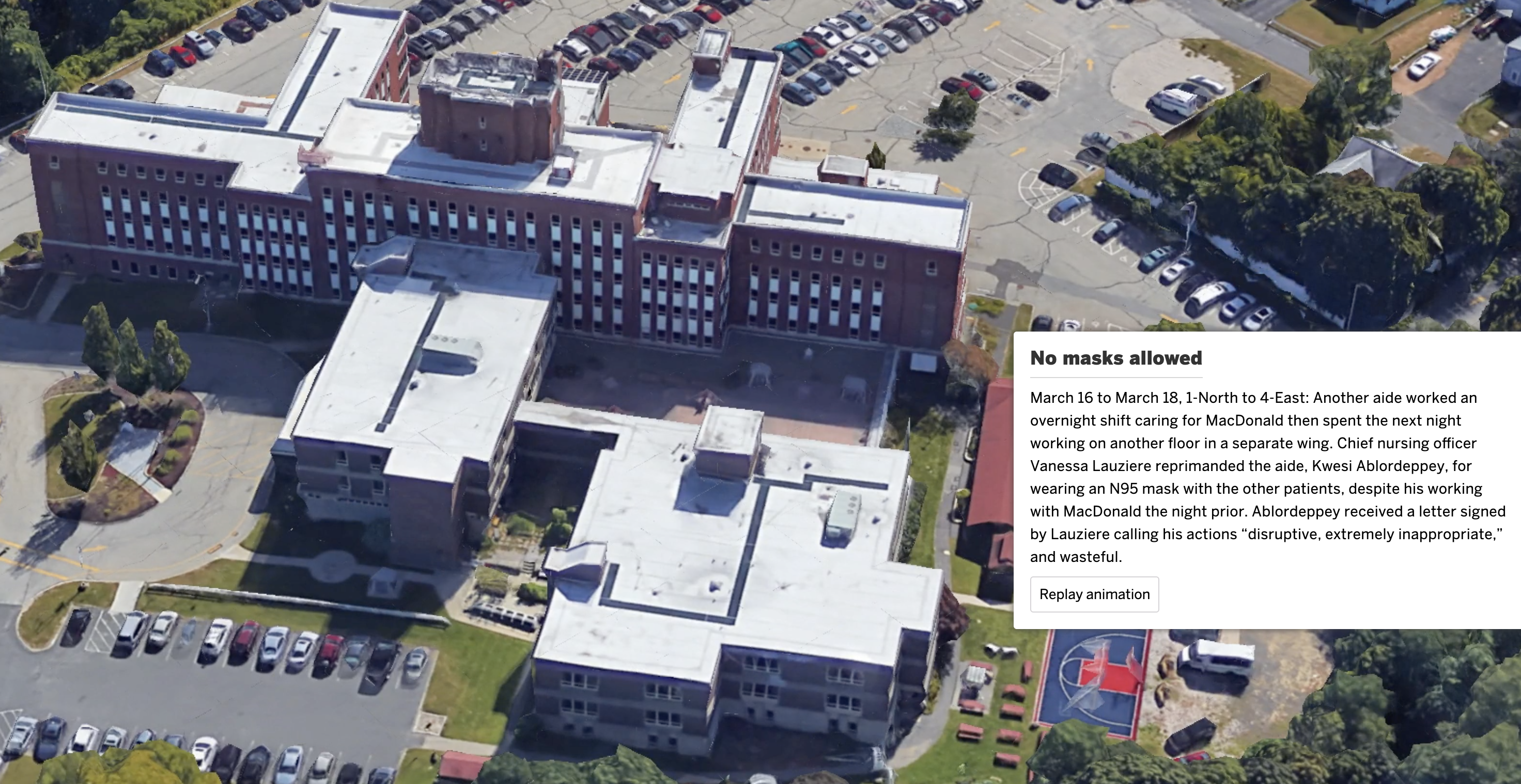
|
|
Small House Model
Certainly the building itself was a
problem. Built in 1952, it had many 3- and 4-bed rooms. In February,
the governor filed a bill for a $400 million bond to rebuild the home.
 I joined other senators to work with the Disabled American Veterans and Dignity Alliance Massachusetts to
ensure that the building will be based on the "small house" model.
Small Houses or Green Houses, first envisioned 20 years ago, are designed
less like hospitals and more like real homes. 10-14 single rooms with
private baths are clustered around a shared kitchen, dining room, living
room and outdoor areas. The Veterans Administration adopted standards for Small Houses in 2010. I joined other senators to work with the Disabled American Veterans and Dignity Alliance Massachusetts to
ensure that the building will be based on the "small house" model.
Small Houses or Green Houses, first envisioned 20 years ago, are designed
less like hospitals and more like real homes. 10-14 single rooms with
private baths are clustered around a shared kitchen, dining room, living
room and outdoor areas. The Veterans Administration adopted standards for Small Houses in 2010.
Small Houses can be grouped together in a large building, like the Leonard Florence Center for Living in Chelsea.
Staff and program in true small houses are also less institutional.
CNAs help residents not just with discrete tasks but help them cook and
do other activities that the residents choose.
Small homes were able to control the pandemic far better. In the VA's
13 small homes across the country, there was only one death. For all
small homes, the death rate was less than 1/10 of traditional nursing
homes.
Veterans deserve the best, most modern and most dignified care. But all people
with disabilities deserve that kind of care too. Nursing homes across
the state have been in crisis, as more people choose more care in the
community, costs rise, and there is a severe shortage of staff.
Conversation about the Holyoke Soldiers Home increased legislators'
knowledge of better models of care. I hope that this session we move more rapidly toward better, community-centered, person-centered long term care for everyone.
Regional Equity
This chart, from the Disabled American
Veterans, shows where veterans live, and where residents of the two
Soldiers' Homes come from. (If you're interested in their other
demographic information, let me know.)
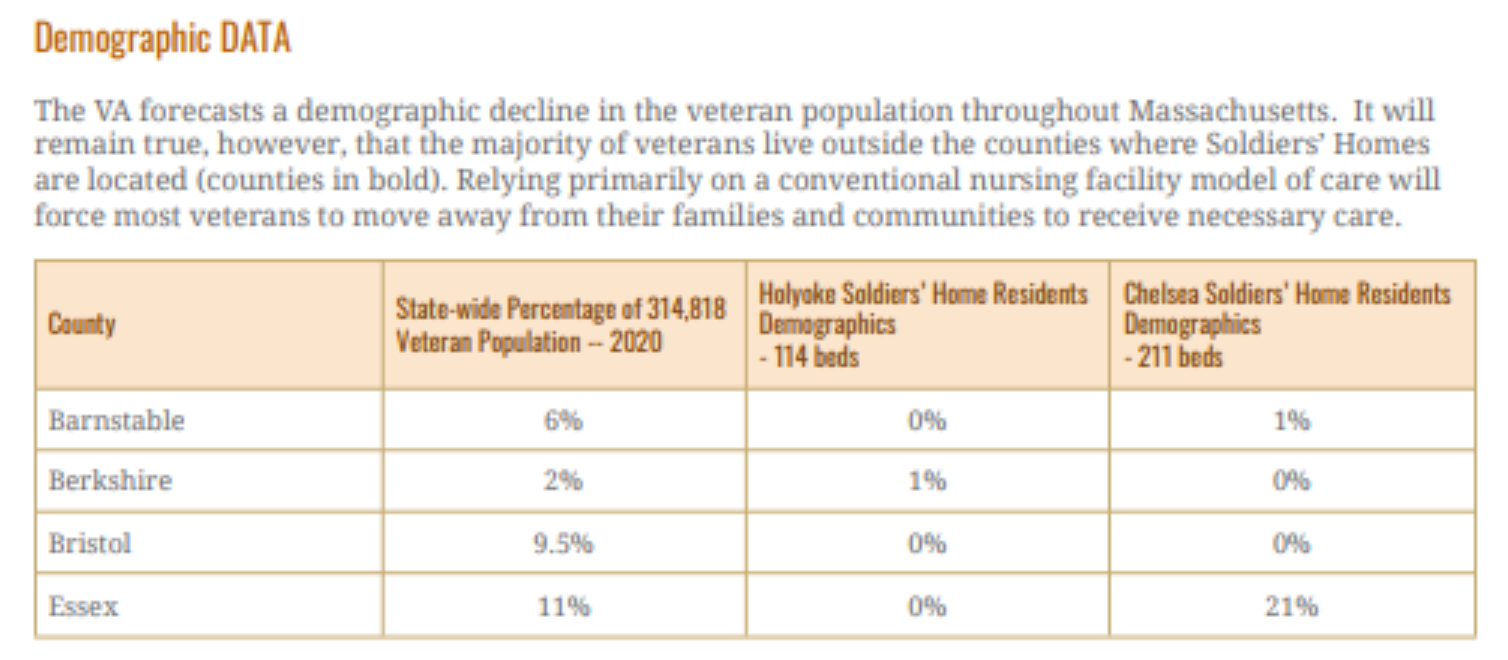
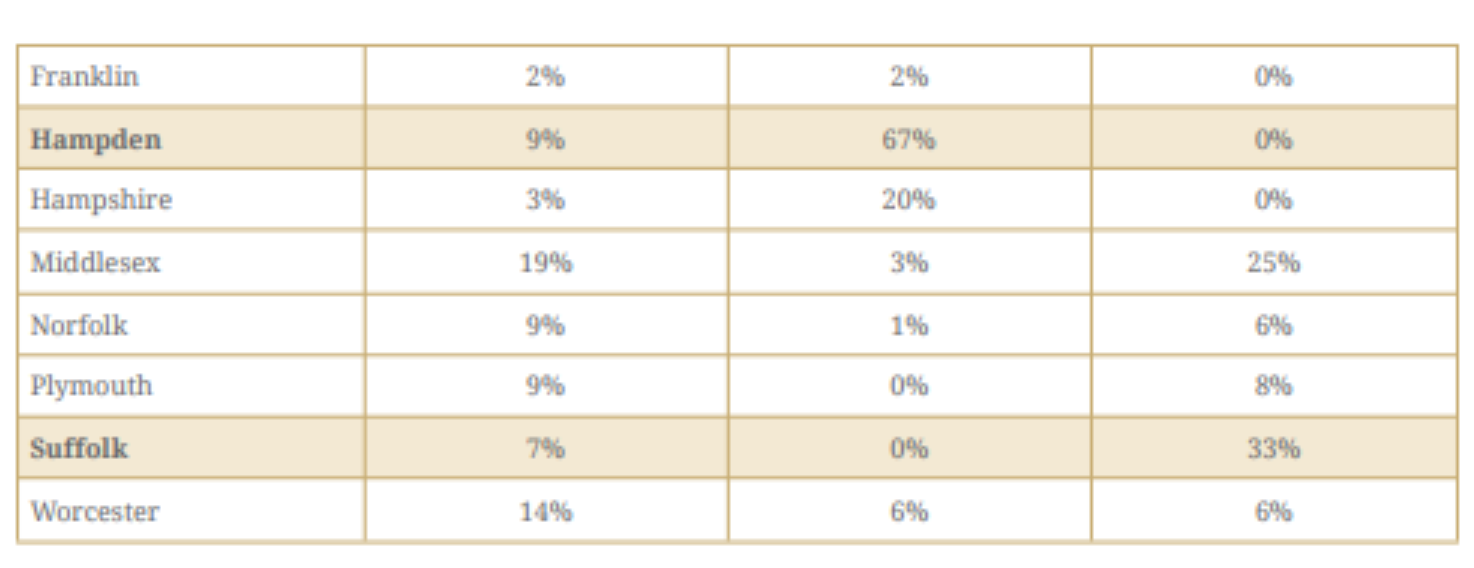
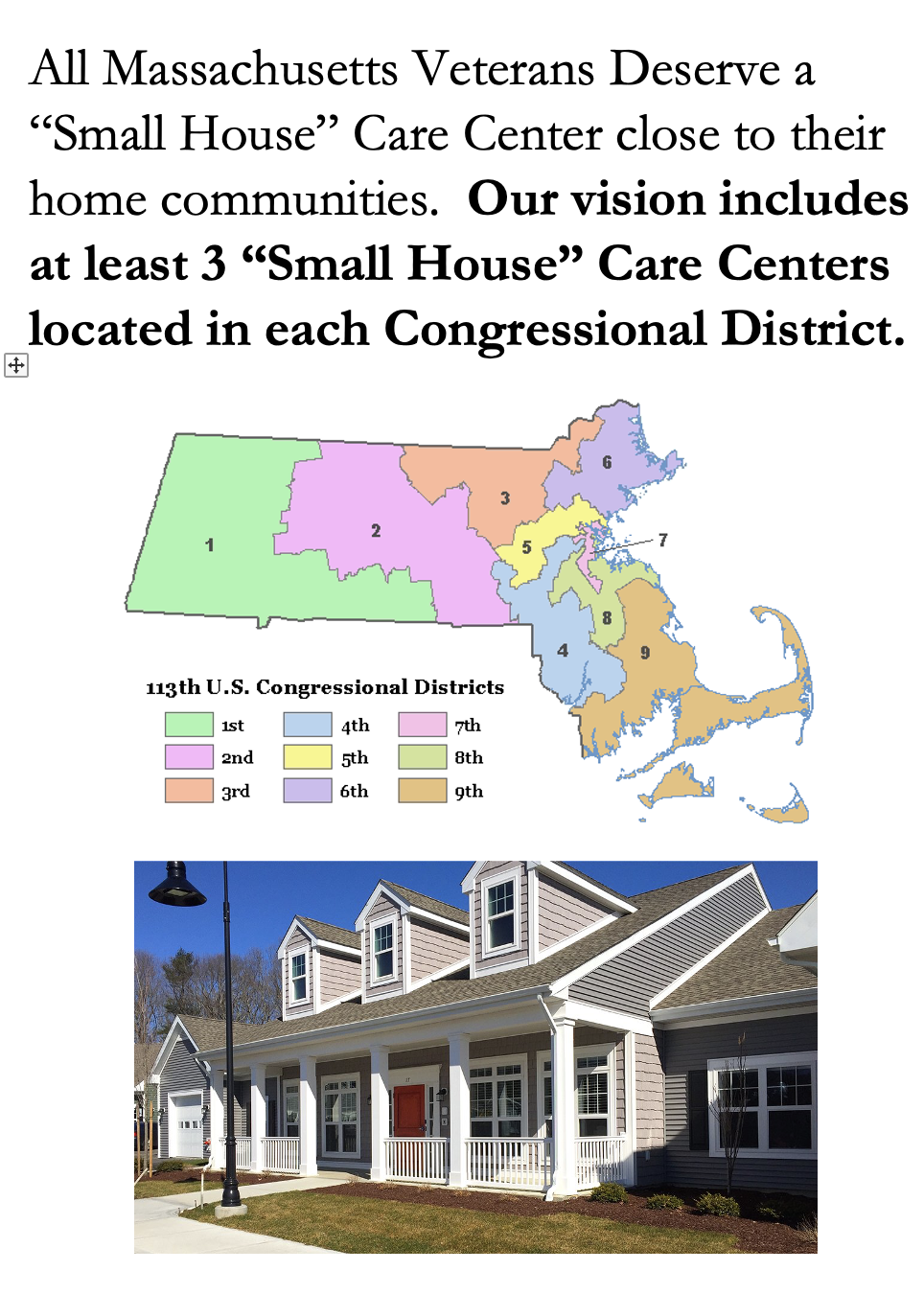 Almost
everyone, in choosing long term care, strongly prefers to live near
their family and friends. Their families and friends also prefer being
able to visit easily. This graphic shows the proposal from Dignity
Alliance and the Disabled American Veterans to build small facilities
across the state. Almost
everyone, in choosing long term care, strongly prefers to live near
their family and friends. Their families and friends also prefer being
able to visit easily. This graphic shows the proposal from Dignity
Alliance and the Disabled American Veterans to build small facilities
across the state.
The
Senate added $200 million to the governor's plan (for a total of $600
million) in order to create regional veterans homes and community-based
services in other parts of the state. The House concurred and the
governor signed the expanded plan.
Labor Standards
The legislature added a requirement that
the Holyoke Soldiers' Home be rebuilt using a Project Labor Agreement
that requires a labor agreement before bidding and hiring, ensuring that
the workforce is diverse, inclusive, well-trained, safe and skilled.
Historically, such agreements on large taxpayer funded projects result
in completion on-time and on or under budget.
The governor vetoed the Project Labor Agreement section, and I hope we soon vote to over-ride his veto.
The Senate also added an Access, Inclusion
and Diversity Committee to help set and monitor the progress of
diversity and inclusion goals, and recommend solutions when necessary.
The House and governor concurred in that provision.
Let me know if there are topics you'd like to hear about in future newsletters.
All best wishes!

|
|
|
|
|
No comments:
Post a Comment
Note: Only a member of this blog may post a comment.